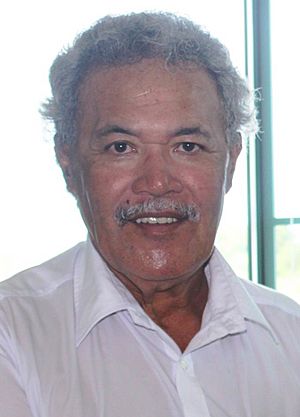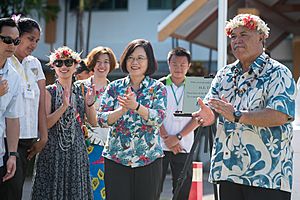Enele Sopoaga facts for kids
Quick facts for kids
Enele Sopoaga
MP
|
|
|---|---|

Sopoaga in 2015
|
|
| Prime Minister of Tuvalu | |
| In office 1 August 2013 – 19 September 2019 |
|
| Monarch | Elizabeth II |
| Governor-General |
|
| Deputy |
|
| Preceded by | Willy Telavi |
| Succeeded by | Kausea Natano |
| Foreign Minister | |
| In office 29 September 2010 – 24 December 2010 |
|
| Preceded by | Apisai Ielemia |
| Succeeded by | Apisai Ielemia |
| Member of Parliament for Nukufetau |
|
| Assumed office 16 September 2010 Serving with Lotoala Metia then Elisala Pita
|
|
| Permanent Representative of Tuvalu to the United Nations | |
| In office 3 July 2001 – 19 December 2006 |
|
| Prime Minister |
|
| Secretary General | Kofi Annan |
| Preceded by | Office established |
| Succeeded by | Afelee F. Pita |
| Personal details | |
| Born | 10 February 1956 |
| Political party | Independent |
| Spouse | Salilo Enele |
| Alma mater | University of Oxford certificate University of Sussex |
Enele Sosene Sopoaga (born on February 10, 1956) is a Tuvaluan diplomat and politician. He served as the Prime Minister of Tuvalu from 2013 to 2019.
Sopoaga was first elected to Parliament in 2010. He became the deputy prime minister and Minister for Foreign Affairs in a government that lasted only a few months. After a political change in 2010, he became the leader of the group opposing the government. In August 2013, he became the temporary prime minister after the previous leader was removed. Soon after, the Parliament voted to remove the old government, and Sopoaga was chosen as the new Prime Minister. He officially took office on August 5, 2013, and formed his team of ministers.
Contents
About Enele Sopoaga
Early Life and Education
Enele Sopoaga studied at important universities. He earned a certificate in Diplomatic Studies from Oxford University in 1990. Later, he received a master's degree from the University of Sussex in 1994. He is married to Salilo Enele, and they have three children. His older brother, Saufatu Sopoaga, was also a prime minister of Tuvalu from 2002 to 2004.
Career in Government and Diplomacy
Before becoming a politician, Sopoaga worked in various government roles. From 1980 to 1986, he was an Education Administrator. He then worked in the Ministry of Foreign Affairs and Economic Planning, becoming a Permanent Secretary (a very high position in the civil service) from 1992 to 1995.
He also served as Tuvalu's High Commissioner to Fiji, Papua New Guinea, and Samoa. From 2001 to 2006, he was Tuvalu's Permanent Representative to the United Nations. This meant he represented Tuvalu at the UN. He was also a vice-chairman for the Alliance of Small Island States (AOSIS), a group that helps small island nations. He was known as Tuvalu's main negotiator for climate change, working to show the world the dangers that climate change poses to small island countries like Tuvalu.
Political Journey
Joining Parliament and Becoming Deputy Prime Minister
In 2010, Sopoaga decided to enter politics and was elected to Parliament for the Nukufetau area. He was expected to become prime minister, but instead, Maatia Toafa was chosen. Sopoaga then became the deputy prime minister and Minister for Foreign Affairs, Environment, and Labour in Toafa's government.
Leading the Opposition
Toafa's government did not last long and was removed by a vote in Parliament in December 2010. Sopoaga tried to become prime minister but lost by one vote. He then became the Leader of the Opposition. In this role, he continued to speak out about climate change. He asked for international help for Tuvalu, including new technologies to help the country adapt to climate change. He also talked about the need for independent news in Tuvalu, so people could get accurate information. To help with this, he started a newspaper company called Tala o Matagi (meaning "Story of the Wind") in 2011.
Becoming Prime Minister

In August 2013, Enele Sopoaga became the temporary prime minister after the previous leader, Willy Telavi, was removed by the Governor-General. A few days later, Sopoaga was officially elected as Prime Minister of Tuvalu by Parliament. He was sworn in on August 5, 2013. He said he would focus on making Tuvalu's voice strong in the fight against climate change. He brought experienced politicians like Vete Sakaio and Maatia Toafa into his new government.
After the 2015 election, Sopoaga was sworn in again as prime minister. He stated that his government would work to make Tuvalu less affected by climate change and global economic changes. In 2017, he launched the Tuvalu Atoll Science Technology Training Institute (TASTTI) to help with training and technology.
Recent Elections
Sopoaga was re-elected as a member of Parliament in the 2019 general election. However, he was not chosen as prime minister. Instead, Kausea Natano became the new prime minister. Sopoaga was also re-elected as a member of Parliament in the 2024 general election.
Working on Tuvalu's Constitution
In 2016, a review of Tuvalu's Constitution began while Sopoaga was prime minister. This project looked at how the government and Parliament worked together. It also considered Tuvalu's international agreements and the country's different communities. In July 2020, Enele Sopoaga was part of a special committee to review the Constitution. This committee's work led to the Constitution of Tuvalu Act 2023, which updated the country's main law.
Fighting Climate Change
Speaking at UN Climate Conferences
Enele Sopoaga has been a strong voice for Tuvalu and other small island nations in the fight against climate change. At the 2009 United Nations Climate Change Conference in Copenhagen, he was a main speaker for the Pacific Small Island Developing States. He pushed for a goal to limit global temperature rise to 1.5 degrees Celsius.
At the 2010 United Nations Climate Change Conference in Cancun, he led Tuvalu's team. He felt more hopeful about the progress made there, even though many issues still needed to be solved.
The Majuro Declaration
As prime minister, Sopoaga worked on international efforts to deal with the problems caused by global warming in Tuvalu. In September 2013, he said that moving Tuvaluans away from their homes because of rising sea levels "should never be an option." He believed that the world needed to feel a moral duty to help.
Under the Majuro Declaration, signed in 2013, Sopoaga committed Tuvalu to using 100% renewable energy for power generation by 2020. This plan included using mostly solar power and some biodiesel.
Tuvalu's National Advisory Council on Climate Change
In January 2014, Prime Minister Sopoaga created the National Advisory Council on Climate Change. This council's job is to find ways to save energy, use more renewable energy, and help Tuvalu adapt to climate change. It also encourages businesses and groups to reduce greenhouse gas emissions.
Speaking at COP21
At the 2015 United Nations Climate Change Conference (COP21) in Paris, Prime Minister Sopoaga was the main spokesperson for the Pacific Small Island Developing States. He strongly argued that the goal for COP21 should be to limit the global temperature rise to below 1.5 degrees Celsius.
In his speech, he said:
Tuvalu’s future at current warming, is already bleak, any further temperature increase will spell the total demise of Tuvalu…. For Small Island Developing States, Least Developed Countries and many others, setting a global temperature goal of below 1.5 degrees Celsius relative to pre-industrial levels is critical. I call on the people of Europe to think carefully about their obsession with 2 degrees. Surely, we must aim for the best future we can deliver and not a weak compromise.
He ended his speech with a powerful message:
Let’s do it for Tuvalu. For if we save Tuvalu we save the world.
Sopoaga believed that important results from COP21 included help for small island states and poorer countries for the damage caused by climate change, and the goal of limiting temperature rise to 1.5 degrees.
Published Work
- Enele Sopoaga wrote a chapter called 'Post War Development' in the book Tuvalu: A History (1983).
| Diplomatic posts | ||
|---|---|---|
| New office | Permanent Representative of Tuvalu to the United Nations 2001–2006 |
Succeeded by Afelee F. Pita |
| Political offices | ||
| Preceded by Willy Telavi |
Prime Minister of Tuvalu 2013–2019 |
Succeeded by Kausea Natano |
| Preceded by Apisai Ielemia |
Foreign Minister of Tuvalu 2010–2010 |
Succeeded by Apisai Ielemia |
See also
 In Spanish: Enele Sopoaga para niños
In Spanish: Enele Sopoaga para niños
- Politics of Tuvalu
- Sopoaga Ministry
 | Mary Eliza Mahoney |
 | Susie King Taylor |
 | Ida Gray |
 | Eliza Ann Grier |

